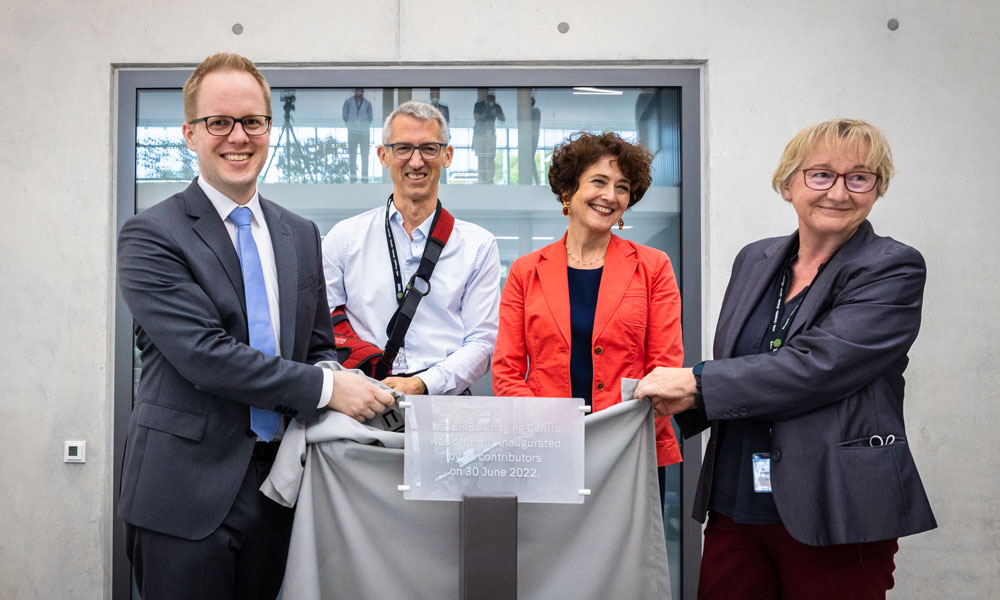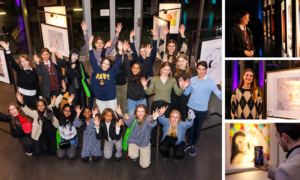Official opening of the EMBL Imaging Centre
Representatives from politics, industry and academia attended the inauguration ceremony at EMBL Heidelberg

The EMBL Imaging Centre provides the global scientific community in academia and industry with access to the latest imaging technologies to enable ground-breaking research. On Thursday, 30 June 2022, the centre was officially opened at the EMBL headquarters in Heidelberg.
Following a welcome address by EMBL Director General Edith Heard, the guests of honour Jens Brandenburg, Parliamentary State Secretary of the Federal Ministry of Education and Research, and Theresia Bauer, Baden-Württemberg Minister of Science, Research and the Arts, officially inaugurated the EMBL Imaging Centre.
Dr Jens Brandenburg, Parliamentary State Secretary, Federal Ministry of Education and Research, said: “The EMBL Imaging Centre offers researchers from all over Europe and beyond access to state-of-the-art electron and light microscopes. We are delighted that EMBL offers this excellent service at its headquarters in Heidelberg. The Federal Ministry of Education and Research is funding the EMBL Imaging Centre to provide groundbreaking new insights into molecular processes. From tumour cells to the impact of the environment – it is here where researchers will investigate the big questions of our time. EMBL is a prominent, globally renowned incubator for new talent. This strengthens the Life Science Cluster in Rhine-Neckar and research in Germany as a whole.”
The EMBL Imaging Centre enables researchers from across the world to access some of the latest microscopy technologies. It facilitates research in all areas of the life sciences, and fosters collaboration between research and industry to push the boundaries of the possible in imaging technologies.
“The opening of the EMBL Imaging Centre is an important moment for the European science community. Access to advanced technologies is key to enabling scientific progress,” said Professor Heard. “EMBL has pioneered many of the imaging technologies and workflows that scientists apply today, and the EMBL Imaging Centre provides a unique opportunity to benefit from such development.”
The building was already completed in summer 2021, within the projected timeframe of two years from having laid the foundation stone. Since then, EMBL scientists began setting up operations, followed by the first visits by scientific users, training provision and the first scientific symposium in May 2022.
By attracting users and visitors to the Rhine-Neckar region, the EMBL Imaging Centre will strengthen the state of Baden-Württemberg as an attractive science and research location.
“Through the Imaging Centre EMBL not only further expands its services, which are already well known far beyond Germany’s borders. With its open architecture, it also enables new insight into research itself. For me, the EMBL Imaging Centre embodies cooperation and openness for the future of science in the region, in Germany, and in Europe. Through a public exhibition, this perspective will be broadened, and new ways to involve the public will become possible,” said Theresia Bauer, Baden-Württemberg Minister of Science, Research and the Arts.
The EMBL Imaging Centre will also act as a training facility for the latest microscopy technologies. In this way, EMBL’s expertise in imaging, from sample preparation to data analysis, can be transferred to global research.
It will additionally provide access to completely new technologies that are not yet commercially available. To enable this, EMBL is working with leading technology developers from academia and industry.
“The open innovation partnership model built between EMBL and its industry partners has successfully led to the creation of this state-of-the-art advanced imaging facility where scientists are enabled and empowered to push scientific boundaries further than ever before,” said Fedja Bobanovic, Vice President Global R&D and Chief Technology Officer at Leica Microsystems. “At Leica, we believe innovative public-private collaborations are essential for driving scientific breakthroughs, generating new discoveries, and ultimately improving human health.”
The creation of the EMBL Imaging Centre was made possible through generous support from the Federal Ministry of Education and Research (BMBF), the State Ministry of Baden-Württemberg for Sciences, Research and Arts (MWK), and by further contributions from industry partners (Thermo Fisher Scientific, Leica Microsystems and Carl Zeiss Microscopy), as well as by donations from the Boehringer Ingelheim Foundation and HeidelbergCement.
Offizielle Eröffnung des EMBL Imaging Centre in Heidelberg
Vertreter:innen von Bund, Land, Industrie und Forschung wohnten der Zeremonie am Europäischen Laboratorium für Molekularbiologie bei
Ziel des EMBL Imaging Centre ist es der weltweiten Wissenschaftsgemeinschaft in Forschung und Industrie neuste Bildgebungsverfahren schnellstmöglich zur Verfügung zu stellen, um bahnbrechende Forschung zu ermöglichen. Am Donnerstag, 30. Juni 2022, fand die offizielle Eröffnungszeremonie des Zentrums am Hauptsitz des Instituts in Heidelberg statt.
Nach Begrüßung der Gäste aus Politik, Industrie und Forschung durch EMBL Generaldirektorin Prof. Dr. Edith Heard weihten die Ehrengäste der Veranstaltung, Dr. Jens Brandenburg, Parlamentarischer Staatssekretär desBundesministeriums für Bildung und Forschung, und Theresia Bauer, Landesministerin Wissenschaft, Forschung und Kunst, das EMBL Imaging Centre offiziell ein.
Dazu erklärte Dr. Jens Brandenburg, Parlamentarischer Staatssekretär, Bundesministerium für Bildung und Forschung: „Das EMBL Imaging Centre bietet Forschenden aus ganz Europa und darüber hinaus Zugang zu Elektronen- und Lichtmikroskopen auf dem neuesten Stand der Technik. Wir freuen uns sehr, dass EMBL diesen exzellenten Service am Hauptstandort in Heidelberg anbietet. Das Bundesministerium für Bildung und Forschung fördert das EMBL Imaging Centre, um bahnbrechende neue Einblicke in molekulare Prozesse zu ermöglichen. Von der Tumorzelle bis zu Umwelteinflüssen werden hier Antworten auf die großen Fragen unserer Zeit erforscht. Als innovative Talentschmiede ist EMBL weltweit sichtbar und anerkannt. Das stärkt das Life Science Cluster in Rhein-Neckar und den deutschen Forschungsstandort insgesamt.“
Das EMBL Imaging Centre bietet Forschenden weltweit Zugang zu neuesten Mikroskopietechnologien. Es ermöglicht Forschung in allen Bereichen der Lebenswissenschaften, und fördert die Kooperation zwischen Forschung und Industrie, um die Grenzen des Möglichen in den bildgebenden Verfahren zu überschreiten.
„Die Eröffnung des EMBL Imaging Centre kennzeichnet einen wichtigen Moment für die europäische Forschungsgemeinschaft. Der Zugang zu neuesten Technologien ist der Schlüssel zum wissenschaftlichen Fortschritt,“ sagte Prof. Dr. Edith Heard, EMBL Generaldirektorin. „Das EMBL hat bei vielen der Mikroskopietechnologien, die Wissenschaftler heute anwenden, Pionierarbeit geleistet. Das EMBL Imaging Centre bietet eine einzigartige Gelegenheit für Forschung und Industrie von solchen Entwicklungen zu profitieren.”
Fertiggestellt wurde das Gebäude bereits im Sommer 2021, innerhalb der geplanten zwei Jahre nach der Grundsteinlegung. Seitdem wurde es zunächst von EMBL in Betrieb genommen, dann folgten erste Besuche von wissenschaftlichen Nutzern, Trainingsangebote sowie das erste wissenschaftliche Symposium im Mai 2022.
Das EMBL Imaging Centre wird Nutzer und Besucher in die Region Rhein-Neckar ziehen, und somit das Land Baden-Württemberg als attraktiven Wissenschafts- und Forschungsstandort stärken.
“Mit dem Imaging Centre erweitert das EMBL nicht nur seine Services, die weit über die Landesgrenzen hinaus bekannt sind, sondern ermöglicht durch eine offene Architektur auch neue Einblicke in die Forschungsarbeit. Das EMBL Imaging Centre verkörpert für mich Kooperation und Offenheit für die Zukunftsfähigkeit der Wissenschaft in der Region, in Deutschland und Europa. Mit einer öffentlich zugänglichen Ausstellung wird diese andere Perspektive erweitert und es werden neue Wege gegangen, um die Bevölkerung mit einzubeziehen,” sagte Theresia Bauer, Landesministerin für Wissenschaft, Forschung und Kunst, Baden-Württemberg.
Zusätzlich werden am EMBL Imaging Centre vollkommen neue, noch nicht kommerziell erhältliche Technologien zur Verfügung stehen. Um dies zu ermöglichen, arbeitet das EMBL mit führenden Technologieentwicklern aus Wissenschaft und Industrie zusammen.
„Das vom EMBL und seinen Industriepartnern entwickelte Modell der offenen Innovationspartnerschaft hat erfolgreich zum Aufbau dieser hochmodernen Imaging-Facility beigetragen. Wissenschaftler werden unterstützt und in die Lage versetzt, die Grenzen wissenschaftlicher Erkenntnis weiter zu verschieben, als je zuvor,” so Dr. Fedja Bobanovic, Vice President Global R&D und Chief Technology Officer bei Leica Microsystems. “Wir bei Leica Microsystems sind überzeugt, dass derartige innovative öffentlich-private Kooperationen von entscheidender Bedeutung sind, wenn es darum geht, wissenschaftliche Durchbrüche voranzutreiben und neue Entdeckungen zu erzielen, die letztlich Fortschritte für die menschliche Gesundheit ermöglichen.”
Ermöglicht wurde das Zentrum durch die Unterstützung des Bundesministeriums für Bildung und Forschung (BMBF), des Ministeriums für Wissenschaft, Forschung und Kunst Baden-Württemberg (MWK) und durch weitere Beiträge von Industriepartnern (Thermo Fisher Scientific, Leica Microsystems und Carl Zeiss Microscopy) sowie durch Spenden der Boehringer Ingelheim Stiftung und HeidelbergCement.



